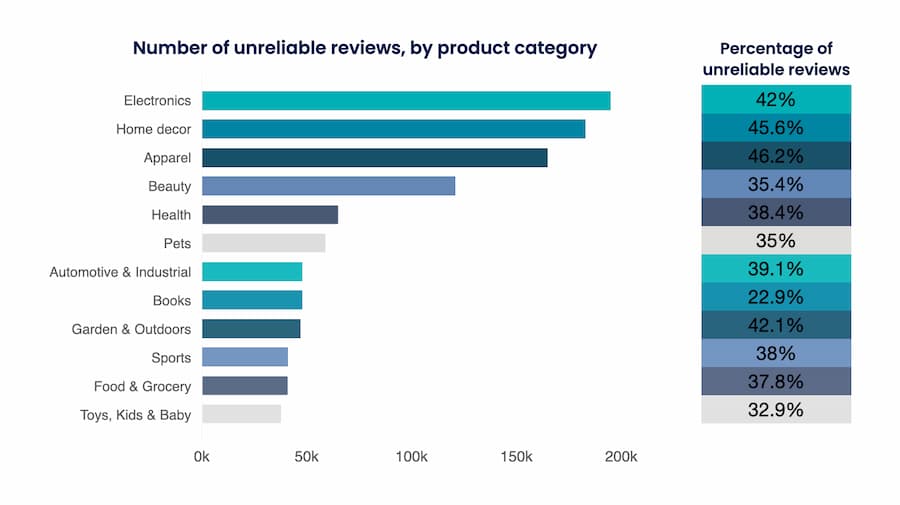Tactics Used By Unethical Reputation Companies
Highlights
- Most reputation management tactics are ethical because they seek to manage the available information about a company without deception.
- There are several ways that an organization can engage in unethical reputation management, including astroturfing, greenwashing, fake reviews, negative reputation website ownership, DDoS attacks, and generating false news about competitors.
Real reputation management involves understanding, correcting, and balancing information about a person or company online.

Unfortunately, there are some tactics that questionable reputation management companies use to get fast results or to con people into using their services. The most prevalent ethics violation may be the least discussed: simply being really bad at what they do. In our experience, most companies that say they manage reputation are fly-by-night operations.
Below are some unethical reputation practices.
Sections
- Astroturfing
- Greenwashing
- Sock puppetry
- Fake reviews and ratings
- Secret mugshot website ownership
- DDoS attacks
- Fabricating company information
- Generating untrue or negative information about competitors
- Ethical reputation management FAQs
Astroturfing
Astroturf is fake grass. Astroturfing is a fake grassroots movement.
When a movement or a cause appears to be a grassroots effort, but in actuality there is a person or organization surreptitiously funding it to spread a message for their benefit, it’s called astroturfing.
Astroturfing hides an organization’s financial connection from an apparently grassroots effort so that the cause looks like it grew organically. This is done to get more people involved, generating a sense of community behind the cause.
Corporate Social Responsibility (CSR) campaigns can sometimes smell like astroturfing. a recent report in Bloomberg demonstrates that companies that made some of the biggest pledges to Black Lives Matter have the fewest black employees.
Are influencers astroturfing?
Using paid influencers can also be a bit like astroturfing because a company is paying an influencer with the hopes that their followers will support positive sentiment toward the company or its practices.
The FTC governs testimonials and endorsements in advertising, and it expanded its definitions to include social media and word-of-mouth advertising. Thus, astroturfing is unethical and could result in a fine of $16,000 per day if it misrepresents a company’s involvement in a cause as part of your marketing strategy.
Greenwashing
Greenwashing is a deceptive marketing strategy used by companies to create the illusion that their products, objectives, and policies are environmentally friendly. Greenwashing involves the use of green PR and green marketing to persuade the public that a company is committed to environmental sustainability, even when it is not true.
Sock puppetry
Sock puppetry is a tactic often associated with social media deception. Wikipedia refers to sock puppets as any “online identity used for purposes of deception.”
Sock puppetry often relates to creating multiple accounts on a platform to engage in an online community deceptively or to vote on something more than once. For example, a company might create multiple accounts to generate fake positive reviews for a product to deceptively make the product seem popular and well-liked. This has been the case with Amazon reviews. Some unethical reputation firms specialize in fake reviews.
Sock puppetry can make it look like a brand has an army of supporters behind them when in reality, they don’t. Because it includes outright deception, it is no big surprise that this is an unethical reputation management strategy.
Meat puppetry
Meat puppetry is similar to sock puppetry, except that the people doing the reviews are real. For example, if you were to ask your friend to write a good review on Amazon for your new book, you are using a meat puppet.
Fake reviews and ratings
Receiving authentic, legitimate online customer reviews is an effective way to showcase your company’s value and customers’ experiences when using your products and services.
There’s nothing unethical about requesting reviews from customers. It’s when you request reviews from non-customers or use unethical tactics to get reviews that this area of reputation management can become a problem.
Companies looking to rise to the top of online rankings sometimes use fake reviews and ratings. More than 80 percent of consumers have read a fake review in the last year.
Most people don’t know when they are reading fake reviews. Some unsavory reputation management or digital marketing agencies position their services to get a company many positive reviews “fast”. But these aren’t reviews from previous customers. They are often completely fabricated.
And yet, when a company faces reputation blunders and needs some online clean-up quickly, these companies that promise rapid results look rather attractive.
Likewise, requesting that your employees write positive reviews or ratings about your company as if they were a customer is also unethical. But asking them to write honest reviews, whether positive or negative, is ethical.

Secret Ownership of Attack Sites
Mugshot publishing and ripoff-type websites are sometimes secretly owned by reputation management companies. details to tabloids and other online sites. Then, a reputation management company reaches out to the individual and tells them that (for a fee, of course) the reputation management company can have the information removed.
The deceptive part of this tactic is that the so-called reputation management company is also the owner of the mugshot publishing website. Of course, they can have the information removed from the internet – they put it there themselves to entice new customers through deceptive practices.
Requesting that websites remove unfavorable, misattributed, or untrue information about you or your company from the internet is not an unethical practice. It’s when these companies create the problem themselves, and then claim to be able to solve it for the customer without disclosing their stake in it, that it becomes unethical.
DDoS Attacks to Take Down Servers
A distributed denial of service (DDoS) attack damages a company’s reputation with its customers because it can take a site down. A DDoS attack strategy starts with a network of computers and devices that a hacker infects with malware. Thanks to the malware, the hacker can control the devices.
The hacker then sends all those devices to the same IP address (for example, a company’s website), thus overwhelming that network. Then, when real customers go to visit that IP address, they get a denial-of-service notice.
This can upset the real customers, thus damaging the company. Additionally, if the company’s site is down too long, it can hurt its search rankings in Google too.
These attacks are so well orchestrated because they involve actual devices. This makes it challenging to see the difference between real traffic and the traffic from the DDoS attack.
Becoming the victim of such an attack can have serious implications for your company’s reputation, which can be why these hackers target you. It is the opposite of reputation management; it’s a malicious tactic for taking down a company.
Fabricating Company Information
Fake sales numbers or otherwise fake company information is also deceptive. Sending around a news release or annual report with intentionally fake information to boost your company’s results is highly unethical.
While an annual report or quarterly sales report can do wonders for corporate reputation, it should always be carefully vetted and researched to ensure 100 percent accuracy. If someone discovers that you have published fake information, it will do much more harm to your reputation than releasing the actual numbers would – no matter how bad your real sales numbers are.
Generating Untrue or Negative Information About Competitors
When bad news about a company comes out stock market prices can be negatively affected. Just imagine if you knew a stock was about to tank. You’d short the stock. Well, if you are a third party controlling a fake news operation, you can do this with relative impunity. The bad news doesn’t need to be out there long, it just needs to go somewhat viral.
Pointing to areas of disparity between what you offer and what your competition offers is an ethical marketing practice. However, releasing untrue propaganda or information targeted at harming your competitors is far from ethical.
Likewise, posting fake negative reviews to ruin your competitor’s reputation is also extremely unethical. Nevertheless, it happens. One study showed that large hotels near boutique hotels had lower ratings than those without boutique competitors nearby. Why? The boutique competitors were posting fake reviews for the larger hotels in hopes that customers would choose the smaller hotels instead.
Ethical reputation management FAQs
What does a reputation manager do?
Reputation managers safeguard a person or company’s reputation by overseeing what information is out there about that person or company. The tactic includes infusing the internet with real and truthful information about the individual or company to help surface positive details and de-emphasize negative ones. Reputation managers oversee many practices, from public relations to SEO reputation management.
Is managing your online reputation necessary?
Yes, prominent individuals and companies should give time and attention to ethical online reputation management. Because consumers do so much of their research online before making a purchase – whether in-store or online – managing your reputation is crucial to success.
Why does your online reputation matter?
Your online reputation has a direct bearing on your credibility. Building trust with companies and consumers starts with open and honest communication strategies and providing the opportunity for your customers to share their feedback with you. Managing and responding to public feedback can have an impact on your success.
